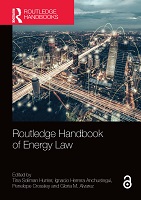Chapter 12 Russian Renewable Energy
Proposal review
Regulations and outcomes
| dc.contributor.author | Kozlova, Mariia | |
| dc.contributor.author | Collan, Mikael | |
| dc.contributor.author | Overland, Indra | |
| dc.date.accessioned | 2020-06-29T08:47:19Z | |
| dc.date.available | 2020-06-29T08:47:19Z | |
| dc.date.issued | 2020 | |
| dc.identifier.isbn | 9780429450891 | en_US |
| dc.identifier.uri | https://library.oapen.org/handle/20.500.12657/39900 | |
| dc.description.abstract | This chapter reviews the development of the legal framework for renewable energy in Russia and discusses the current state of renewable energy in the country. The Russian support scheme for renewable energy is elaborated in detail for both the wholesale and retail energy markets, and the outcomes of the policy are assessed based on the current state of renewable energy in Russia. Russia has introduced an unusual scheme to promote renewable energy: compensating investments in capacity installed and guaranteeing investors a certain return on their investments. This instrument is known in the literature as a ‘capacity-based mechanism’ or simply a ‘capacity mechanism’. The capacity mechanism also imposes some restrictions and incentives to motivate renewable-energy production and attempts to minimise the cost burden of the subsidies on the taxpayer. Renewable-energy investments in other countries are commonly supported by paying projects for the electricity produced, rather than the installed capacity. The Russian approach has practical relevance from the policymakers’ perspective because, in contrast to conventional power plants that can be operated non-stop to produce electricity, many forms of renewable energy are not able to guarantee production on command. Paying for actual electricity production encourages investors to select appropriate sites for renewable energy generation. However, the Russian case demonstrates that renewables can also be supported through installed capacity. In this chapter, we present a short overview of Russian renewable-energy policy, review the academic literature on this topic, and analyse the outcomes of the policy in terms of the current state of renewable energy in Russia, paying particular attention to the effect of the capacity mechanism. | en_US |
| dc.language | English | en_US |
| dc.subject.classification | thema EDItEUR::L Law::LA Jurisprudence and general issues | en_US |
| dc.subject.classification | thema EDItEUR::L Law::LB International law | en_US |
| dc.subject.classification | thema EDItEUR::L Law::LN Laws of specific jurisdictions and specific areas of law::LNC Company, commercial and competition law: general::LNCR Energy and natural resources law | en_US |
| dc.subject.other | energy law | en_US |
| dc.subject.other | renewable energy | en_US |
| dc.subject.other | renewable energy in Russia | en_US |
| dc.title | Chapter 12 Russian Renewable Energy | en_US |
| dc.title.alternative | Regulations and outcomes | en_US |
| dc.type | chapter | |
| oapen.relation.isPublishedBy | 7b3c7b10-5b1e-40b3-860e-c6dd5197f0bb | en_US |
| oapen.relation.isPartOfBook | 6b2d21b1-ab3c-45a1-bb42-d5b19e58f3c1 | en_US |
| oapen.imprint | Routledge | en_US |
| oapen.pages | 18 | en_US |
| oapen.remark.public | 3-8-2020 - No DOI registered in CrossRef for ISBN 9781138324459 | |
| peerreview.anonymity | Single-anonymised | |
| peerreview.id | bc80075c-96cc-4740-a9f3-a234bc2598f1 | |
| peerreview.open.review | No | |
| peerreview.publish.responsibility | Publisher | |
| peerreview.review.stage | Pre-publication | |
| peerreview.review.type | Proposal | |
| peerreview.reviewer.type | Internal editor | |
| peerreview.reviewer.type | External peer reviewer | |
| peerreview.title | Proposal review |

